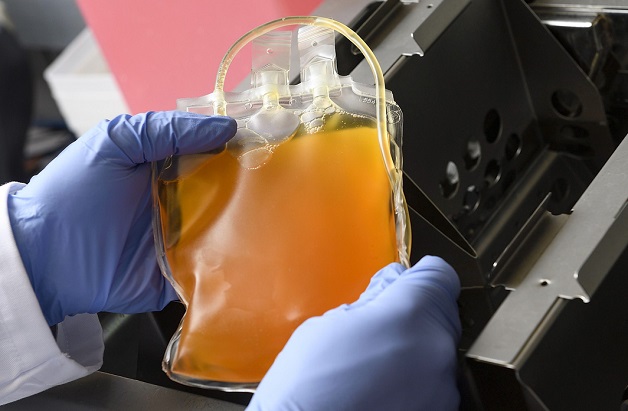Scientists Warn of Autoantibodies Found in Donated Blood from Recovered COVID-19 Patients
Nikhil Prasad Fact checked by:Thailand Medical News Team Nov 09, 2025 3 months, 19 hours, 6 minutes ago
Medical News: Researchers Uncover Hidden Immune Risks in Convalescent Plasma
A new scientific investigation has raised fresh concerns about blood donations from people who previously had COVID-19. Conducted by the Blood Transfusion Centre of Slovenia and the University of Ljubljana, the study discovered that some individuals who recovered from the virus and donated convalescent plasma carried temporary autoantibodies—immune proteins that mistakenly attack the body’s own tissues. While these autoantibodies faded over time, the discovery highlights an overlooked aspect of how COVID-19 can briefly disrupt immune balance and possibly affect plasma safety in the early post-recovery phase.
 Scientists Warn of Autoantibodies Found in Donated Blood from Recovered COVID-19 Patients
Scientists Warn of Autoantibodies Found in Donated Blood from Recovered COVID-19 Patients
The findings were based on detailed analysis of blood plasma from 101 recovered COVID-19 donors compared to 48 healthy volunteers. According to this
Medical News report, the research team found that several types of autoantibodies—including anti-Smith (anti-SM), anti-SSA/Ro60, and anti-Ribosomal P—appeared at slightly higher levels in plasma collected during the first two months after infection. However, the study reassured that these abnormal antibodies declined significantly by three to four months after recovery, showing that the autoimmune reaction was short-lived.
The Study and Its Surprising Findings
The research divided the plasma donors into three groups depending on the time since their infection—0–60 days, 60–120 days, and 120–180 days—and tested for 20 different autoantibodies linked to well-known autoimmune diseases such as lupus, rheumatoid arthritis, and Sjögren’s syndrome. Plasma collected soon after infection showed minor but noticeable increases in certain immune markers, suggesting the body was still in a state of mild immune confusion. By 60–120 days after illness, these levels had normalized and closely matched those of healthy individuals, showing no ongoing autoimmune reaction.
Interestingly, the scientists also looked for connections between the protective antibodies against SARS-CoV-2 (neutralizing antibodies) and the unwanted autoantibodies. They found no meaningful correlation between the two, which means that a strong antiviral immune response did not cause the autoimmune patterns. This is an important discovery as it suggests the body’s efforts to fight the virus do not necessarily lead to long-term immune damage.
Implications For Blood Donation and Treatment Safety
During the pandemic, convalescent plasma from recovered patients was used as an emergency treatment for those with severe COVID-19 infections. However, experts were unsure whether plasma from recovered donors might contain harmful antibodies. This study provides reassurance that while certain autoantibodies can appear temporarily, they tend to vanish after a few months.
The research also stressed that the best time to collect convalescent
plasma for therapy is between 60 and 120 days after recovery—long enough for any immune irregularities to fade but soon enough for the plasma to still contain potent virus-neutralizing antibodies.
The study also sheds light on how viral infections can trigger brief autoimmune activity. Scientists believe that SARS-CoV-2 can cause “molecular mimicry,” where the immune system confuses the body’s own tissues for viral invaders. This leads to short-term production of self-reactive antibodies, which usually decline as the immune system resets.
A Temporary Immune Disturbance, But A Valuable Warning
While the presence of these autoantibodies does not seem to pose lasting health risks, it serves as a reminder that COVID-19 can affect more than just the lungs—it can temporarily reprogram the immune system. Understanding these changes is crucial, not just for ensuring plasma safety, but also for uncovering the hidden mechanisms behind post-COVID complications such as fatigue and inflammation.
Researchers concluded that plasma collected from donors 60 to 120 days after infection remains both effective and immunologically safe. Their results provide vital guidance for future pandemic preparedness, especially when using blood-based therapies derived from recovered patients.
The study findings were published in the peer reviewed journal: Vox Sanguinis
https://onlinelibrary.wiley.com/doi/10.1111/vox.70140
For the latest COVID-19 News, keep on logging to Thailand
Medical News.
Read Also:
https://www.thailandmedical.news/articles/coronavirus
